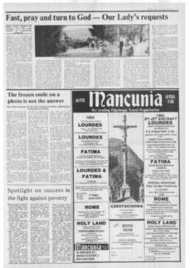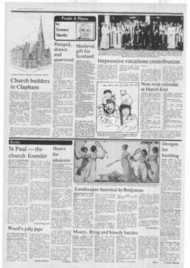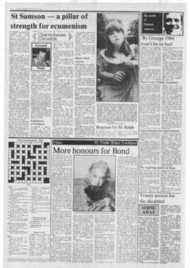Page 4, 30th December 1983
Page 4

Report an error
Noticed an error on this page?If you've noticed an error in this article please click here to report it.
Tags
Share
Related articles
Lapsing In The Varsity Gap
Public School Lapsing Scandal
Is Our Schools Bill Worth It?
Undergraduates On University 'lapses'
The Leakage
Hidebound by an institutional structure
YOUR LEADER dealing with the problem of lapsed university freshmen from Catholic public schools provides a peg on which to raise the whole question of what can be done to regain those who have left us and to help people on the fringe or maybe outside the sacramental life of the church and thus having difficulty trying to lead a Catholic life.
• It is also common knowledge that many of our secondary school children miss Sunday Mass even before leaving school, which does not augur well for their spiritual welfare when going out into the world.
One also sees on TV and in the press, as well as hears on radio, prominent "showbiz" and other personalities almost boasting that they are lapsed Catholics. This causes me, at any rate, to wonder what has led to such a situation and what, if anything, can be done about it?
As you say, it is generally not due to intellectual difficulties, but obviously marriage and sexual problems of one kind and another enter into it, clumsy handling of people by priests, bad example in the home and within families.
The church seems to be hidebound by its own legalistic/institutional structure, even though Our Divine Lord put love before law and had some harsh things to say about those who were quite content as long as the letter of the law was fulfilled.
To give an example, the very successful experiment of penitential services/general absolution (of great help I am sure to those who for one reason or another have been away from the sacraments for a long time) was spoiled because the powers that be, speaking through the prefect of the Roman Congregation involved, have stated that even after general absolution (when sins are forgiven) the person availing himself-herself of it must still in the future confess privately to a priest.
Accordingly we are back at square one if Cardinal Ratzinger's dictum prevails, though it was pleasing to see that an American archbishop of the Synod opined that that was not the end of the matter, important though the eminence's views are.
Maurice Mahoney I.ondon WC2 THERE ARE a number of objections to Terry Sheehy's tendentious article written around the Cambridge University chaplain's annual report, but I shall confine my remarks to three.
First, many pupils from Catholic schools, accustomed to school religion, are inclined to look upon the Church as a schoolteacher with the consequent fear that they will be checked up on in matters of Mass attendance. Publication of easily identifiable young people's names in a Catholic newspaper simply confirms those fears.
Secondly, the figures are not even valid. There are four parish churches in Cambridge; there was no compulsion on students to fill in the forms at the Mass census; and to suggest that attendance at Mass on one particular Sunday at the chaplaincy implies a practising Catholic, while absence confirms lapsing, is simply naive.
University chaplaincies are places where students are respected as young adults searching for God and for meaning in their lives. They and the chaplains are there to help such young people in their search.
These young' adults, prospective teachers, doctors, scientists, engineers, lawyers, nced specialised help and encouragement if their faith is to mature and flourish: the pressures on them are many and often unhelpful.
To suggest, as Terry Sheehy does, that such chaplaincies are unnecessary and too costly, is to show a remarkable ignorance both of the needs of students and the actual cost of chaplaincies.
Dom Raphael Applehy Catholic Chaplaincies in Higher Education 53 Cromwell Road, London SW7
blog comments powered by Disqus









